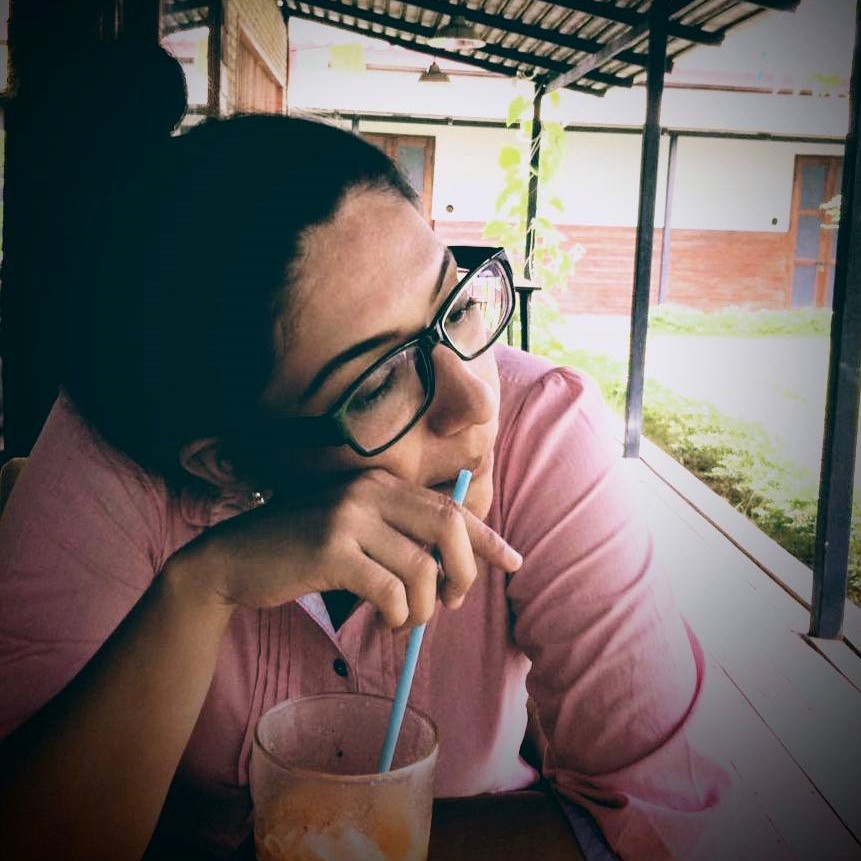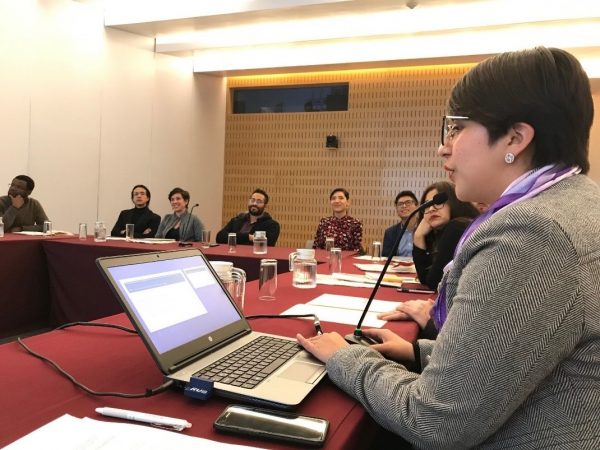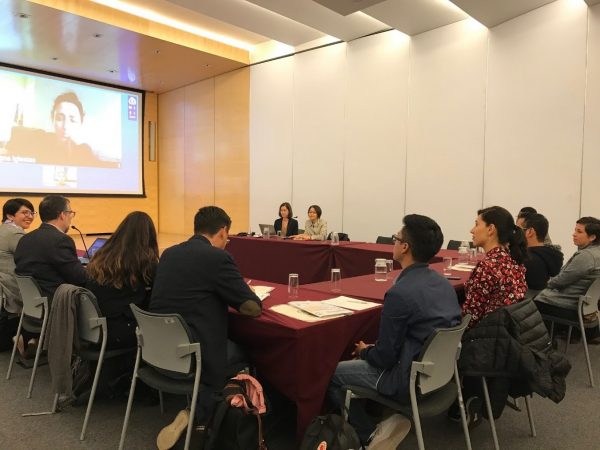Voices from the Sylff Community
In November 2018, a Local Association Networking Support (LANS) event was held at El Colegio de México (Colmex) with 10 Sylff fellows from the institution. In addition, two Sylff fellows from Colmex who now live abroad participated in the discussions via video conference. Also held concurrently at Colmex was “SIMPOSIO INTERNACIONAL: MUJERES POR LA IGUALDAD, LA LIBERACIÓN Y EL EMPODERAMIENTO EN MÉXICO Y JAPÓN, 1888–2018 (International Symposium: Women for Equality, Liberation, and Empowerment in Mexico and Japan),” . Thus, there was a good incentive for graduated Sylff fellows to visit their alma mater. The discussions at the LANS meeting centered on reactivating the local Sylff chapter in Mexico and encouraging networking among Sylff fellows. From the Sylff Association Secretariat, Mari Suzuki and Aya Oyamada attended the event.
* * *
In the presence of officers of the Sylff Association Secretariat, Colmex authorities and Sylff fellows gathered on November 22, 2018, in an attempt to reactivate the Sylff chapter in Mexico. We had participants from both Mexico and abroad thanks to the support of the LANS program.
During the first part of the meeting, fellows briefly introduced themselves, and Aya Oyamada explained to them the different support programs that the Sylff Association offered, such as Sylff Research Abroad (SRA), Sylff Leadership Initiative (SLI), and Sylff Leaders Workshop, among others. The participants showed an interest in the programs, and some of them expressed their gratitude for the support they received.
Sylff Fellows’ Voices at Colmex
In the second part of the meeting, Ms. Alejandra González, a 2015 Sylff fellow who is currently head of the Academic Exchange Office and is involved in the management of the Colmex Sylff program, shared some of the participants’ thoughts and expectations for the meeting. Here are some of their opinions as to why a local association network is needed:
- “To maintain a consolidated group, to invite other people to participate in this program, and to strength our relationship with other fellows.”— Ms. Cecilia Castro, Centre for Demographic, Urban and Environmental Studies (CEDUA), 2017–2019 Sylff fellow
- “The Sylff local network stands for me as a promoter of personal academic expectations . . . a network that links common interests around the world to promote research.”— Mr. Diego Merino, Centre for Studies of Asia and Africa (CEAA), 2017–2019 Sylff fellow
- “To improve our academic and social work, especially in the current political and social context of Mexico . . . we need social and academic leaderships with a high human vision.”—Mr. Erick Serna, CEDUA, 2016–2017 Sylff fellow
- “To achieve a strong commitment among the fellows . . . and to socialize [our] research.”— Ms. Carmen Caballero, CEDUA, 2015–2016 Sylff fellow
- “To make a difference in the community [and to] strengthen the connections between former and present Sylff fellows [through] the consolidation of a safe environment to exchange academic ideas, work, and proposals.”— Ms. Jimena Forcada, CEAA, 2015–2016 Sylff fellow
- “To promote spaces that will enable the exchange of experiences about the research process, design, and implementation of public policies for addressing social problems. Additionally, the network may also be used for other purposes, such as encouraging alliances with other Sylff institutions, undertaking social action projects about topics that impact the region, and establishing an observatory of conjuncture about this.”— Ms. Laura Ballén, CEDUA, 2013–2015 Sylff fellow
- “The reactivation of the Colmex Sylff Association has to include current and graduate fellows. . . . We can now generate projects to benefit communities beyond Mexico.”— Ms. Marcela Méndez, CEDUA, 2007–2009 Sylff fellow
Reactivation of the Sylff Chapter in Mexico: Academic Projects with Social Impact
During the discussion on future actions for the reactivation of the Sylff chapter in Mexico, participants shared several ideas regarding the purposes and possible projects of the local chapter. Given that all fellows were or are graduate students, we agreed that all projects should have an academic basis in each of the fields that we specialize in. However, we also stated that such projects should have a strong social outreach element, especially after the experience of some of the fellows in the aftermath of the earthquake in Mexico City on September 19, 2017. Ms. Marcela Méndez said, “[We need] common objectives and a strong will to bring a change in Mexico and abroad; but we should start with an initiative with impact in our community.” Ms. Laura Ballén noted that Sylff fellows must “choose topics that suit most of our research fields, such as migration and violence; in order to know our research interests, we should define a way to communicate and share information using technology,” while Ms. Mariana Iglesias supported the idea of “nurturing research from different perspectives so that we might start thinking about what to do with our ideas and set a possible calendar with follow-up meetings.” Mr. Saúl Espino suggested “combining perspectives and trying to achieve social impact,” and Mr. Erick Serna strongly supported the idea. Mr. Amaury García, director of the Center for Asian and African Studies at Colmex and a guest at the meeting, stressed, “The local association needs fluent communication, support of the programs from Colmex authorities, and to find a way, a mechanism, for the association to work.” Ms. Alejandra González said, “The Academic Exchange Office might serve as a liaison between the Sylff Association Secretariat in Japan and the Sylff fellows, as well as a coordinator for future projects.”
In a brief presentation, Ms. Fernanda Herrera talked about Colmex’s response to the September 2017 Mexico Earthquake and how important the help of the Tokyo Foundation for Policy Research was during this crisis. After the presentation, Sylff fellows understood the importance of a strong local association and how things would have been different if they knew before the tragedy.
Sylff fellows agreed that before launching any project, they should get to know one another and establish a channel of communication. For this purpose, a Facebook group was created under the name “Sylff Mexico” with an eye to the next meeting. After taking this first step, fellows understood the potential of their interdisciplinary knowledge to push forward a project with direct social influence. This is a great opportunity to work with bright and excellent fellows with a human quality—leaders from different backgrounds with the same goal of constructing a better society. Ms. Oyamada suggested fellows to “apply for the Sylff Leadership Initiatives as a group of Sylff fellows if you aim for social impact.” Ms. Mari Suzuki also said, “The aim of Local Association Networking Support is to encourage networking among Sylff fellows from the same Sylff institution. The Secretariat hopes to hold a fellow meeting annually, inviting more fellows from distant cities with the support of LANS. By having face-to-face meetings regularly, ideas for collaborative research and social action will gradually prosper.”
Participating fellows also gave the following feedback:
- “My participation could be a link between Sylff Mexico (at Colmex) and Juarez City (Chihuahua) and thus invite more collaborators who are currently working outside Mexico City, including in foreign countries.”— Ms. Carmen Caballero
- “The way I could support the network is through a civil-society organization of which I am a part called the Institute of Philosophy and Culture.”— Mr. Diego Merino
- “I will volunteer to be a Colmex Sylff Association liaison representative in Japan.”— Ms. Marcela Mendez
- “I can participate in the construction of a work plan and write documents, like reviews and proposals. In addition, I can contact institutions in my country [Colombia] to establish alliances that allow the development of activities to exchange experiences.”— Ms. Laura Ballén
Conclusion: In order for the local association to work, there must be fluent communication among the fellows. After stable communication has been established, fellows should suggest possible projects to work in the community and strive to achieve their goal.
List of Participants
|
Name |
Current Affiliation |
Resident Area |
Fellowship Year |
|
El Colegio de México |
Mexico City |
2017–2019 |
|
|
Diego Eduardo Merino Lazarín |
El Colegio de México |
Mexico City |
2017–2019 |
|
El Colegio de México |
Mexico City |
2016–2017 |
|
|
El Colegio de México |
Mexico City |
2016–2017 |
|
|
Mariana Iglesias Arellano |
Harvard University |
Boston, United States |
2016–2017 |
|
El Colegio de México |
Mexico City |
2016–2017 |
|
|
Jimena Forcada Velasco |
El Colegio de México |
Mexico City |
2015–2016 |
|
Schwarz Coulangé Méroné |
El Colegio de México |
Mexico City |
2015–2016 |
|
El Colegio de México |
Mexico City |
2015–2016 |
|
|
Carmen Amelia Caballero Lozano |
Municipal Institute of Research and Planning |
Ciudad Juarez |
2015–2016 |
|
Ministry of Internal Affairs |
Bogota, Colombia |
2013–2015 |
|
|
Kanagawa Prefectural lnstitute of Language and Culture Studies |
Fujisawa, Japan |
2007–2009 |


